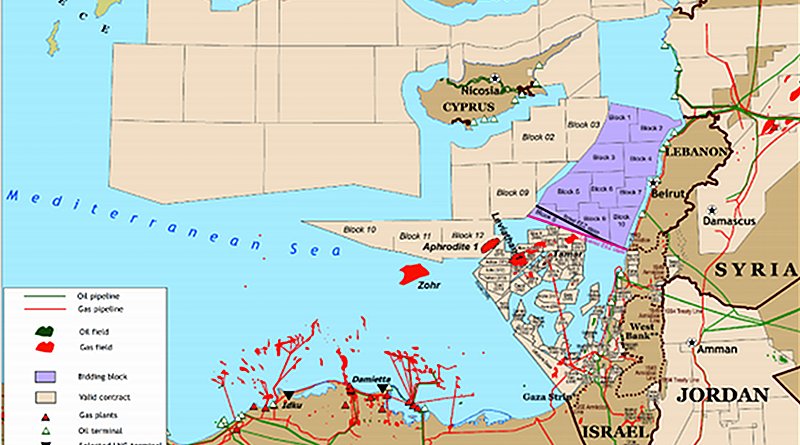Geopolitical Tensions May Make EastMed Pipeline Unfeasible – OpEd
By Ramzy Baroud
Massive natural gas discoveries off the eastern coast of Israel are slated to make Tel Aviv a regional energy hub. Whether Israel will be able to translate positive indicators of the largely untapped gas reserves into actual economic and strategic wealth is yet to be seen. What is certain, however, is that the Middle East is already in the throes of a major geostrategic war, which has the potential to become an actual military confrontation. Unsurprisingly, Israel is at the heart of this growing conflict.
“Last week, we started to stream gas to Egypt. We turned Israel into an energy superpower,” Israeli Prime Minister Benjamin Netanyahu bragged during a Cabinet meeting on Jan. 19. Netanyahu’s self-congratulatory remarks came on the heels of some exciting financial news for the embattled prime minister, as both Jordan and Egypt are now Tel Aviv’s clients, receiving billions of cubic meters of Israeli gas.
For Netanyahu, pumping Israeli gas to two neighboring Arab countries means more than just economic and political advantage — it is a huge personal boost. The Israeli leader is trying to convince the public to vote for him in yet another general electionin March, while pleading with Israel’s political elite to give him immunity so that he doesn’t have to face various corruption charges.
For years, Israel has been exploiting the discovery of massive deposits of natural gas in the Leviathan and Tamar fields — located about 125 and 80 kilometers west of Haifa, respectively — to reconstruct regional alliances and redefine its geopolitical centrality to Europe. The Israeli strategy, however, has created potential for conflict in an already unstable region, expanding the power play to include Cyprus, Greece, France, Italy and Libya, as well as Egypt, Turkey, Lebanon and Russia.
On Jan. 2, Netanyahu was in Athens signing a gas pipeline dealalongside Greek Prime Minister Kyriakos Mitsotakis and Cypriot President Nicos Anastasiades. The EastMed pipeline is projectedto connect Israel to Cyprus, Greece and, ultimately, Italy, thus transporting Eastern Mediterranean gas directly to the heart of Europe.
A few years ago, this scenario seemed unthinkable, as Israel had previously importedmuch of its natural gas from neighboring Egypt. The Tamar field partly rectified Israel’s reliance on imported gas when it began production in 2013. Shortly after, Israel struck gas again, this time with far greater potential, in the massive Leviathan field. At the end of last month, Leviathan began pumping gas for the first time.
“Leviathan is estimated to hold over 21 trillion cubic feet of natural gas — enough to fill Israeli power-generation needs for the next 40 years, while still leaving an ample supply for export,” Frank Musmar wrote for the BESA Centerfor Strategic Studies.
Egypt’s purchase of Israeli gas — 85 billion cubic meters, with an estimated cost of $19.5 billion — was acquiredthrough the private entity Dolphinus Holdings. The Jordanian deal was signed between the country’s national electricity company NEPCO and American firm Noble Energy, which owns a 40 percent stake in Leviathan.
Jordanians have been protesting Israel’s gas deal en masse, as they view economic cooperation between their country and Israel as an act of normalization, especially as Tel Aviv continues to occupy and oppress Palestinians. And the echoes of the popular protests have obviously reached the Jordanian Parliament, which on Jan. 19 unanimously voted in favor of banning gas imports from Israel.
Israel is diversifying beyond exerting regional economic dominance to becoming a big player on the international geopolitical stage. The EastMed pipeline project, estimated to cost $7 billion, is expected to satisfy 10 percent of Europe’s overall need for natural gas. This is where things get even more interesting. Turkey believes that the pipeline deal, which involves its regional rivals Cyprus and Greece, is designed specifically to marginalize it economically by excluding it from the Mediterranean’s hydrocarbon boom.
Ankara is already a massive energy hub, being the host of TurkStream, which carriesRussian natural gas to Europe and fulfills about 40 percent of the continent’s demand. This has provided both Moscow and Ankara with geostrategic leverage as well as economic advantage. If the EastMed pipeline becomes a reality, Turkey and Russia stand to lose the most.
In a series of surprising moves in the last month, Turkey retaliated by signing a maritime border dealwith Libya’s internationally recognized Government of National Accord (GNA) and committing to send military support to help Tripoli in its fight against the forces loyal to Field Marshall Khalifa Haftar. “Turkey will not permit any activity that is against its own interests in the region,” Fuat Oktay, Turkey’s vice president, told Anadolu News Agency, adding that “any plan that disregards Turkey has absolutely no chance of success.”
Although European countries were quick to condemn Ankara, the latter has succeeded in changing the rules of the game by staking a claim to vast areas of the Mediterranean that are in the exclusive economic zones of Greece and Cyprus. Not only will Turkey be drilling for natural gas in Libya’s territorial waters, but also in those of Cyprus. Ankara is accusing Cyprus of violating “the equal claim to discoveries” — an arrangement that followed the military conflict between the countries in 1974.
If the issue is not resolved, the EastMed pipeline project could potentially turn into a pipe dream. What, from an Israeli point of view, seemed like a lucrative deal with immense geopolitical significance now appears to be another extension of the wider Middle Eastern conflict.
While the EU is eager to loosen Russia’s strategic control over the natural gas market, the EastMed pipeline increasingly appears unfeasible from every possible angle. However, considering the massive deposits of natural gas that are ready to fuel struggling European markets, it is almost certain that Mediterranean natural gas will eventually become a major source of political disputes, if not war.

